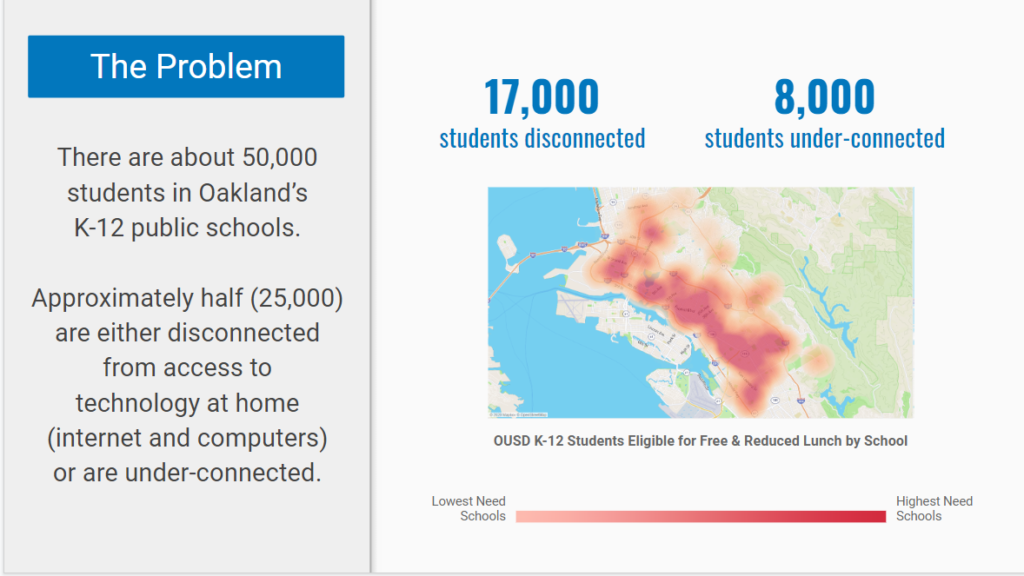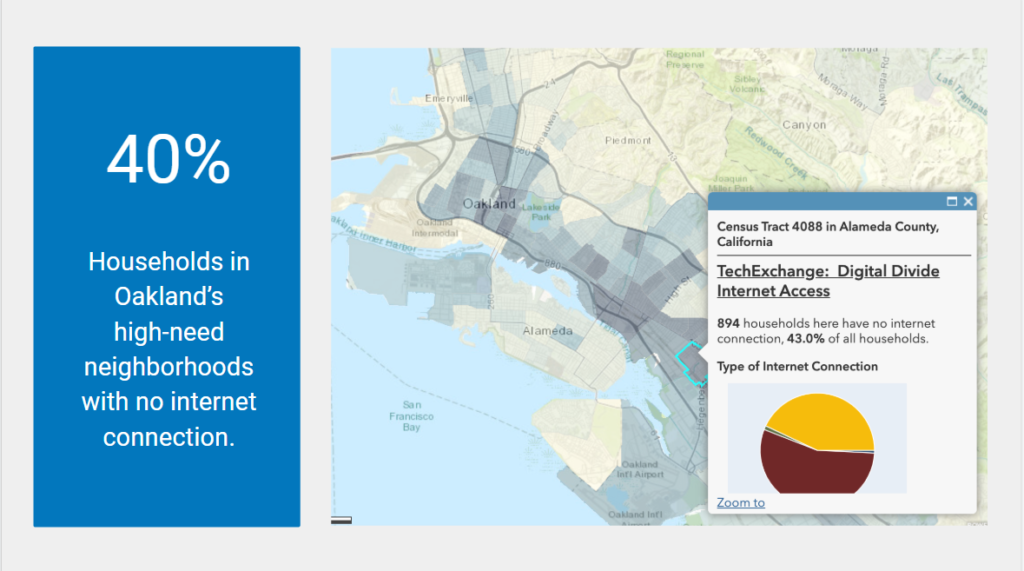I would guess more than half of Oakland’s Flatland families are worrying about food. They also are worrying about rent. And when that will be due. Some are getting pressure to pay right now. They can’t. How much money do you think they have to pay for internet?
You know the answer.
So, when I see a press release claiming OUSD and City of Oakland Announce Plan to CLOSE the Digital Divide; Bold $12.5 Million Plan Launches on Thursday! I have to question the use of “CLOSE” when there is no guarantee of free high quality internet. Sure, you can get devices into hands, but if kids can’t get online, it really doesn’t matter.
The current plan relies entirely on private internet providers to give “free or low cost internet for at least two years.” I can read between the lines and know who will fall between the cracks. The same kids that have always fallen, and they will fall further. Digital untouchables who can’t even access the schoolhouse door.
When you don’t have food, or cant pay rent or other utilities, $10 a month is too much. And where education is critical and compulsory, it is on us to keep the school house door open to all.
We need a basic foundation of Internet for All (please sign the petition). No strings attached. That should be the foundation for any deal in Oakland or anywhere. And any deal that does not promise that falls short.
No Tolls to Ener the Digital Schoolhouse
The schoolhouse door is and always will be digital, and we can’t exclude children for their parent’s inability or even unwillingness to pay. An accident of birth should not determine your academic fate. Or whether you can even attend school.
So, I applaud the City and OUSD for recognizing the need. It is great to see OUSD and the City really get together on the status of K-12 education and also to partner with an incredible community resource in Tech Exchange. And though I know some of y’all would never want some private company to help. There have been several industry partners who are stepping up. So, we are building the right team, we see the problem, but we have the wrong solution.
Our families need answers now, and this collaboration is the right set up. And you can see the immense need (full proposal here). The numbers are staggering. Roughly half of public school students, 25,000, lack reliable access. With glaring and painful disparities based on income and race.


We are not going to get two bites at this apple. So we need to get this right.
I don’t have all the answers here, but I do know that relying on private companies to provide this, and charging families is the wrong one. Private companies could be the backbone of an inclusive and responsive network. It just should not be on parents to pay for it. So, if we prioritzed funding to these children, and as I recently heard the Comcast representative describe, the district could “sponsor” those accounts and just pay for them. Depending on how that plays out on the ground, that may not be a bad idea. We need to push for more state and federal funding. But that could work.
An internet Lifeline Program
Any low income person can get a subsidized phone. Any low income student should get free internet. And it’s not like the phone companies go broke because of Lifeline, they pass those costs on to the rest of us. They can do the same thing with internet. I am fine with paying a little more every month if I know that Oakland’s youth can get online. I think a lot of other folks are as well.
Public Answers
Its also possible to just cut the private companies out altogether. Some cities like Chattanooga and Helsinki have provided very high speed internet themselves. Others have created “mesh networks” to serve those areas ignored by providers. We don’t have to accept a pardigm where our families are at the shifting mercy of broadband providers.
The superintendent’s words from the press conference ring true,
“This is about equity in education. Every student deserves the ability to study and learn at home, but here in the 21st century, that’s just not fully possible if you cannot access the internet,” said Superintendent Kyla Johnson-Trammell, in a statement. “That’s why we are starting this critical effort to get technology and wi-fi into every student’s home, and to continue the effort every year into the future.
“The internet should be a public utility like water, power and even the freeway system, for all of us to use,” Johnson-Trammell continued. “Until we have universal broadband in this country, we need to do all we can to make the internet available to our students.”
Now we need a plan that will guarantee internet for all, now and forever, and not just for those whose parents can pay for it.

